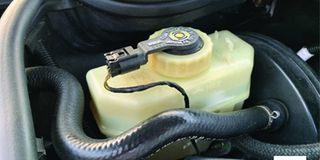Ask the Mechanic: What is involved in servicing a BMW brake fluid system?

Hello Paul, I recently bought a used 2009 BMW X5 from the United Kingdom and its information display shows that all service requirements are okay except brake fluid service, which is due. My question is, what is involved and can I do this brake fluid service at a petrol station service bay?
Patrick
Hello Patrick, brake fluid service ought to be carried out every two to three years or as per the BMW brake fluid service counter. Brake fluid service for your BMW, as other modern cars, should be carried out by a knowledgeable mechanic using a special brake fluid bleeder and service machine.
There is a procedure to follow and safety precautions to bear in mind when handling brake fluid during this service. After the brake fluid service is carried out, a diagnostic tool has to be used to reset the brake fluid service counter.
The brake systems for modern vehicles work with brake efficiency enhancing systems such as the ABS (Anti-lock Brake System) or EBD (Electronic Brake Force Distribution).
These activities require precision and prompt delivery of hydraulic brake fluid pressure. Brake fluid should be renewed because it ages with time and use. Brake fluid is a hydraulic oil, which is pressursed in the brake system to help engage the brakes and stop the heavy and often fast moving car. In other words, brake fluid is what is between your brake pedal and brakes that helps to stop your car.
Brake fluid is chemically designed to remain soluble with lubricating properties which flow around the brake system, protect moving components in the brake system such as pistons from metal shear damage or overheating due to friction.
Good brake fluid also has additives which reduce oxidation, inhibit corrosion and heat (heat disipator) to prevent damage, as well as maintain good performance of the brake system components.
Overtime and with use, brake fluid’s hygroscopic nature attracts moisture, while the corrosion and heat inhibitors or other additives age and reduce their protective and performance enhancing roles.

MY STEERING WHEEL IS HARD
Hello Paul, I own a Toyota Mark X whose steering periodically gets hard. It all started when I hit a big hump at high speed. However, currently, whenever an Electric Power Steering (EPS) light shows on the dashboard, the steering becomes stiff. What could be the cause and solution?
Bamwine
Hello Bamwine, your Toyota may have intermittent failure of the EPS, an electrically powered steering designed to reduce energy loss or the amount of effort needed to steer your vehicle.
Unlike the conventional hydraulic steering systems, EPS uses the body control module (BCM), power steering control module (PSCM), a torque sensor and EPS motor.
These components rely on the car system voltage to run and a serial database to communicate between each other and the message centre. The EPS motor is built into the steering column and not the steering rack.
Inspection of this system is best done with a computer diagnostic tool, which will interrogate the system to identify whether it is component or circuit failure.
Common causes of breakdown include relay or fuse failure or broken circuit due to a loose or damaged connector. Mechanical damage of the steering column after an accident can also cause failure of the EPS.
Get a good technician to inspect this for you.

CAN I ELIMINATE THE CATALYTIC CONVERTOR ON MY CAR?
Hello Paul, my mechanic says the catalytic converter in my exhaust pipe is damaged and needs to be replaced. It will be expensive though and I do not have the money. Will the car still work properly if I just have it removed and fit a straight pipe in the gap it leaves?
Stanley
Hello Stanley, it is not recommended to remove or eliminate the catalytic converter by replacing it with a straight pipe. The catalytic converter is a honey comb-like device fitted in your exhaust system and designed to chemically reduce harmful engine emissions that flow through it.
When you run your car engine without it, you increase pollution, cause emission-related faults on your car engine management system and ensuing reduced performance. Consult a mechanic to help identify affordable replacement catalytic converters or repair of the system.

DO TIPTRONIC GEARBOXES GIVE YOU FLEXIBILITY?
Hello Paul, is it true that Tiptronic gearboxes can be manual or automatic, and that they give drivers the best of both worlds?
Gavin
Hello Gavin, yes, it is true that Tiptronic (steptronic) gearboxes found in some modern cars offer drivers a bit of the manual and automatic transmission experience. Tiptronic gearboxes are an innovation which gives drivers flexibility to control the gearbox manually when they wish while still maintaining the automatic functionality. The tiptronic gearboxes provide you with a balance between the manual transmission and the benefits of an automatic transmission. Tiptronic gearboxes are useful for the youthful or performance drivers who may need more control of the gear shifts such as delaying them for more power when accelerating or powering uphill or quicker up shifts when driving downhill. You enjoy the manual intervention while maintaining the automatic clutch less transmission shifting experience.
Send your comments and questions to [email protected]




